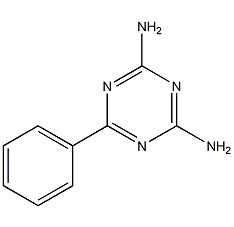
Structural formula
| Business number | 0241 |
|---|---|
| Molecular formula | C9H9N5 |
| Molecular weight | 187.20 |
| label |
benzene melamine, 2,4-diamino-6-phenyl-1,3,5-triazine, Benzoguanamine,99%, Benzinated melamine (2,4diamino-6-phenyl-1,3,5-triazine), benzene guano amine, benzene melamine diamine, 2 4 – 2-amino -6 – Phenyl – 1,3,5-triazine, benzo guanidine amine, 99%, benzoguanamine (2,4-diamino-6-Phenyl-1,3,5-triazine), Heterocyclic compounds |
Numbering system
CAS number:91-76-9
MDL number:MFCD00023187
EINECS number:202-095-6
RTECS number:XY7000000
BRN number:153223
PubChem number:24893677
Physical property data
1. Properties: white powder
2. Density (g/mL, 25/4℃): 1.40
3. Relative vapor density (g/mL, air = 1): Undetermined
4. Melting point (ºC): 224~228
5. Boiling point (ºC, normal pressure): Undetermined
6. Boiling point (ºC, 5.2kPa): Not determined
7. Refractive index: Not determined
8. Flash point (ºC): Not determined
9. Specific rotation (º): Undetermined
10. Autoignition point or ignition temperature (ºC): Undetermined
11. Vapor pressure (kPa, 25ºC): Undetermined
12. Saturated vapor pressure (kPa, 60ºC): Undetermined
13. Heat of combustion (KJ/mol): Undetermined
14. Critical temperature ( ºC): Undetermined
15. Critical pressure (KPa): Undetermined
16. Log value of oil-water (octanol/water) partition coefficient: Undetermined
17. Explosion upper limit (%, V/V): Undetermined
18. Explosion lower limit (%, V/V): Undetermined
19. Solubility: Soluble in ethanol, ether and dilute hydrochloric acid, partially soluble in dimethylformamide, insoluble in acetone, chloroform and ethyl acetate. Very slightly soluble in water (22℃, 0.06%, 100℃, 0.6%).
Toxicological data
None yet
Ecological data
Harmful to fish.
Do not allow this product to come into contact with groundwater, waterways or sewage systems.
Water Hazard Level 2 (German Regulation) (self-assessment via list): Hazardous to water��’s.
Even small amounts of product seeping into the ground can pose a hazard to drinking water.
Do not discharge materials into the surrounding environment without government permission.
Hazardous to organic matter in the water.
Molecular structure data
1. Molar refractive index: 53.59
2. Molar volume (cm3/mol): 138.9
3. Isotonic specific volume (90.2K): 414.7
4. Surface tension (dyne/cm): 79.3
5. Polarizability (10-24cm3): 21.24
Compute chemical data
1. Reference value for hydrophobic parameter calculation (XlogP): None
2. Number of hydrogen bond donors: 2
3. Number of hydrogen bond acceptors: 5
4. Number of rotatable chemical bonds: 1
5. Number of tautomers: 5
6. Topological molecule polar surface area 90.7
7. Number of heavy atoms: 14
8. Surface charge: 0
9. Complexity: 170
10. Number of isotope atoms: 0
11. Determine the number of atomic stereocenters: 0
12. Uncertain number of atomic stereocenters: 0
13. Determine the number of chemical bond stereocenters: 0
14. Number of uncertain chemical bond stereocenters: 0
15. Number of covalent bond units: 1
Properties and stability
1. White crystal. Soluble in ethanol, ether and dilute hydrochloric acid, partially soluble in N, N-dimethylformamide and acetone, very slightly soluble in ethyl acetate and chloroform, insoluble in water, benzene and ether. Overheating may decompose and release toxic gases. Combustible and toxic.
2.May be toxic, the specific toxicity is unknown. You cansee the toxicity and protective methods of cyanuric acid. This product is toxic. The oral LD50 for mice is 1500 mg/kg. For packaging, storage and transportation, please refer to cyanuric acid.
Storage method
This product should be sealed and stored in a cool, ventilated warehouse, away from fire and heat sources.
Synthesis method
It is synthesized using benzonitrile and dicyandiamide as raw materials. The synthesis reaction is carried out in an organic solvent (butanol), using sodium hydroxide as a catalyst. The reaction releases heat and precipitates benzene melamine. The finished product is obtained by vacuum filtration, water washing and drying. The industrial product is white powder with a melting point of 224-228°C. Each ton of product consumes 580kg of benzonitrile and 580kg of dicyandiamide.


Purpose
Manufacture of thermosetting resins, pesticides, pharmaceuticals and dyes. Used to produce thermosetting resins, modified resins, amino coatings and plastics, medicines, pesticides and dyes. 1. Benzene melamine for metal coatings is the same as melamine. In addition to being used as an intermediate for special chemicals, most of them react with formaldehyde to form hydroxymethylated benzene melamine, which is used as a molding material. Resin fiber processing aid for lamination. The hydroxymethylated benzoguanamine is further denatured with alcohol to obtain an alkylate, which becomes a coating mainly used for metals. 2. Decorative board: Using benzene melamine as decorative board is one of the most distinctive ways of using it. In addition, resin-impregnated paper is used as a veneer for concrete slabs, which can make the surface of the concrete slab smooth and flat, facilitate demoulding, and have excellent durability. Fluorescent pigments based on benzene melamine resin are used as colorants and printing inks for polypropylene, polyethylene, hard and soft polyvinyl chloride and other resins, and their uses and demand are also developing. Benzinated melamine is further reacted to produce butanol etherified benzinated melamine formaldehyde resin, and methanol etherified benzinated melamine formaldehyde resin. They can be used as cross-linking agents in baking coatings and can be mixed with alkyd resins, acrylic resins, etc. to make coatings. In addition, the methylol compound of benzomelamine can be mixed with urea-formaldehyde resin, phenolic resin, and melamine-formaldehyde resin to make molding materials. It is used to manufacture modified melamine formaldehyde resin, which improves its solubility in organic solvents after modification.

 微信扫一扫打赏
微信扫一扫打赏

